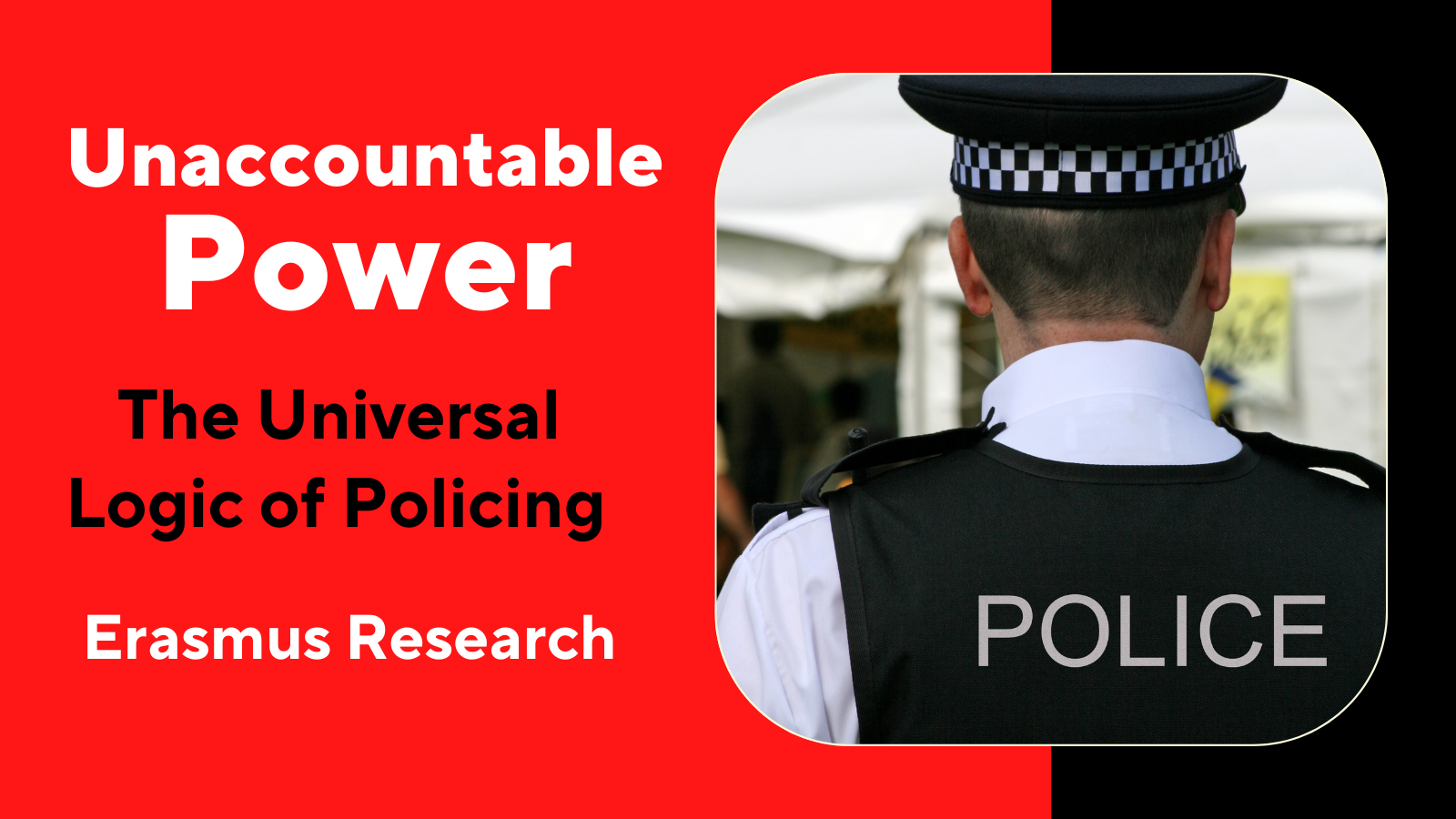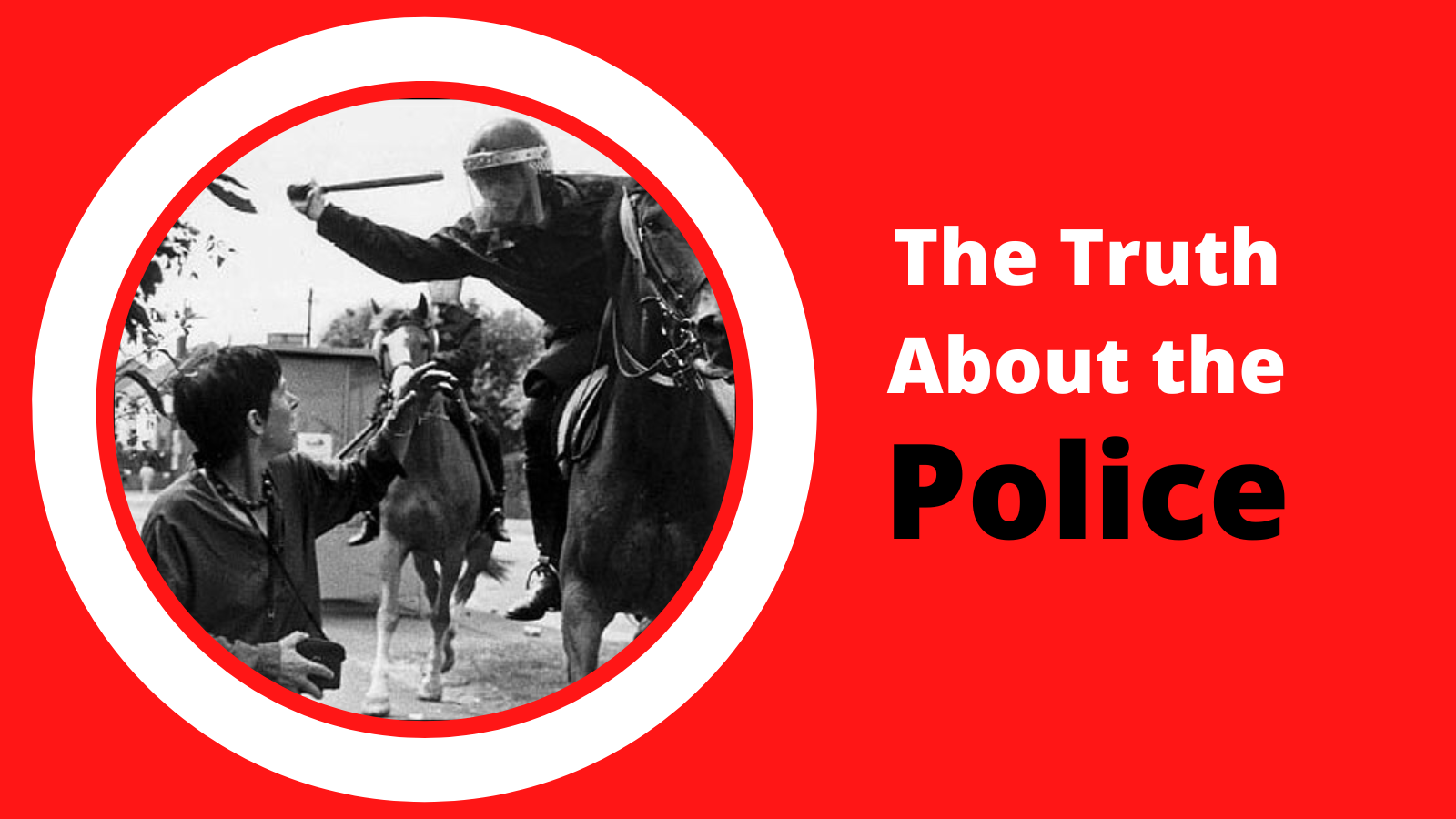“Of more than 23,000 complaints made about policing between 2020-2021, only 18 resulted in further action.” Novara Media
This is what unaccountable police power looks like from a statistical perspective.
In every country and in every political context, the police are, in every case, the state police. Whether operating within a system that calls itself liberal, neoliberal, socialist, communist, or fascist, the logic of policing is the same. Whether in China, Canada, North Korea, Nigeria, Brazil, Russia, Norway, Australia, the US or the UK, the universal logic of policing is characterised by two interconnected demands. On the one hand the police demand more powers and more resources to enforce these powers. On the other hand, the police demand more discretion, shielding them from independent oversight and any form of accountability.
Universal Demand #1 – More Powers and More Resources
The policing paradox is itself characterised by the fact that, when all the evidence points to the inevitable failure of policing, it is always and in all cases countered with a call for more police and more policing powers. “Policing doesn’t work, we need more police.” At a time when the global movement of organised labour is slowly emerging from its weakest position in almost a century, the police unions and federations are stronger than they have ever been.
In 2022, the UK has seen an unprecedented increase in both police powers and resources. Indeed, police budgets have risen dramatically in the last five years. The Public Order Bill currently being pushed through parliament (unopposed by the Labour opposition), as well as the Police, Crime, Sentencing and Courts Act 2022 have seen unprecedented increases in unaccountable levels of police powers. When it comes to policing, more powers and more resources, go hand in hand.
In the US in August 2022, President Biden announced his $37 billion public safety programme, an integral part of his Safer America Plan. The political determination to increase police powers and resources, as well as pressure from the most powerful police federation in the world, resulted in tens of billions of aid money finding its way into the budgets of police departments across the US. According to the Marshall Project (2022), of the $1.9 trillion handed out through the Biden administration’s American Rescue Plan Act in 2021, almost half of the money was spent by cities, states and counties on policing and prisons. The money, originally designated for food assistance and wage-aid as well as covering health insurance premiums during the period of the COVID pandemic, was easily diverted to policing since there were few limitations imposed on how it should actually be spent.
As governments around the world, irrespective of their political identities, become increasingly reliant on authoritarian forms of control to maintain their, there is, universally, a relentless expansion of the global police state.
Universal Demand #2 – More Discretionary Powers (i.e., less independent oversight and less accountability)
In the UK, Home Secretary Suella Braverman, while pledging to give the police more powers and resources, is simultaneously calling for the UK to abandon the European Convention on Human Rights, a charter that provides a raft of protections against the abuses of government and state violence. Removing protections is one way to achieve the unprecedented levels of unaccountable power universally demanded by the police. Another way to avoid independent scrutiny, oversight and indeed any other form of regulatory impediment, is to dislodge the issue of crime from ‘harm’ (criminal and social harm), and onto the plane of ‘risk management’. The global obsession with actuarial policing – using entirely pseudo-scientific methods to try to predict and prevent crime before it happens – has led to an entire raft of legislative measures for dealing with risk, through processes of risk assessment and risk management.
A useful example is the current approach to counterterrorism policing, and in particular, the national roll-out of the Prevent programme, which requires all Muslim men who seek support for their mental health and wellbeing, to be referred by healthcare professionals to the police, so that risk assessments can be carried out. Prevent involves perfectly innocent men being subjected to extreme forms of policing, surveillance and control, all in the name of managing ‘risk’.
The Consequences of Unaccountable Police Power
There has, particularly in the UK, been an entire raft of reports condemning the police as racist, misogynist, sexist, and unable to adequately tackle corruption. The Metropolitan Police have come under particular scrutiny following the rape and murder of Sarah Everard by a serving police officer who, despite being reported for several accounts of indecent exposure, was promoted to Firearms Officer, a role with augmented powers. The report, commissioned by the Home Office found that vetting procedures in the police were wholly inadequate and that, as one of the authors of the report claims (see clip below), that the Inspectorate estimate that vetting is so problematic within the police, that one in five officers should not have been allowed to join or should have at least had special controls placed upon them.
That it has been ‘officially estimated’ that such a high percentage of police officers, 20% of the total, pose a significant risk to the public should come as no surprise. The following are just some of the many findings from a raft of recent reports condemning the police in the UK.
- The Home Office investigation found that, stop and search laws allowed male police officers to routinely harass and sexually assault female members of the public.
- It’s not just the public who are at risk of sexual predation from the police. The sample interviews of female police officers found that they had all been victims of harassment and/ or sexual assault at the hands of their male colleagues. There was almost unanimous dissatisfaction with the outcome of any complaints or concern raised.
- These claims follow a damning report by the Independent Office for Police Conduct (IOPC) which found an endemic culture of misogyny, racism, sexism and homophobia within the police. Evidence showed that Met Officers casually joked with each other about hitting and raping women, harming members of the public, and actively covering up serious assaults and other forms of sexual violence by their colleagues.
- The statistical evidence shows that in almost every country in the world, citizens are more likely to be sexually assaulted by a police officer than from any other group. A recent Panorama programme, showed that in just three years, over 2000 police officers were reported for serious sexual misconduct in the UK (a problem it has been acknowledged is grossly unreported). Almost all of them have remained in post. In Scotland, of the 250 police officers investigated for serious sexual misconduct since 2019, not one was dismissed, with most returning to work and some allowed to resign, pension intact. That members of the public are at considerable risk of sexual harm from the police is a statistical fact; that the police can commit sexual crimes with impunity is almost guaranteed.
- The same is true for domestic violence. Recent FOIs in Scotland have shown that action is rarely taken against police officers who abuse their own partners, and almost all return to work.
The key issue, presented by the various reports by inspectorates and watchdogs, all point to a situation in which the police are out of control. That the police are a greater risk to the public than the public are to themselves is nothing new. This is the central pillar of the abolitionist movement as well as the foundation for calls, particularly in the US, to defund the police. The problem with the reports referred to above is that they generally remain embedded in the notion of a ‘dangerous minority’, associating the problems identified as arising from bad vetting practices, and failures within the police to address crime perpetrated by their own officers.
There are two fundamental problems with this standpoint. The first is that all policing is, as Walter Benjamin argued over a century ago, founded entirely on the use and threat of violence. The job of deciding what levels of violence are legitimate and which are ‘criminal’, is a task that is beyond the remit of the police themselves. There needs to be significantly more oversight and accountability of the police, not a relentless drive for less. The second point is even more central to the problem. The very fact that the police enjoy unprecedented levels of unaccountable power over members of the public results in the most petty and vindictive people in society, irrespective of which country or political regime, being drawn to its ranks. Unaccountable power, as evidenced above in relation to the impunity with which the police can cause various forms of harm, is the problem. This is what draws, and what will continue to draw to the ranks of the police worldwide, people who are a danger to the public.







